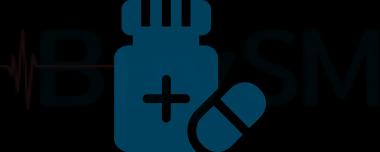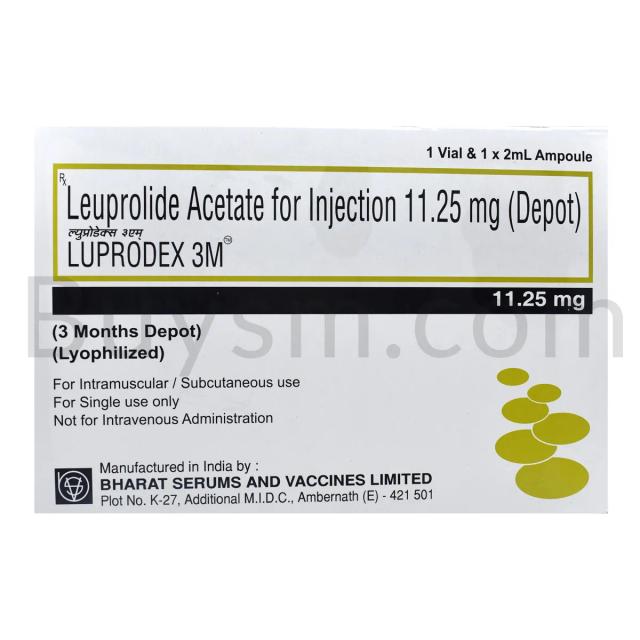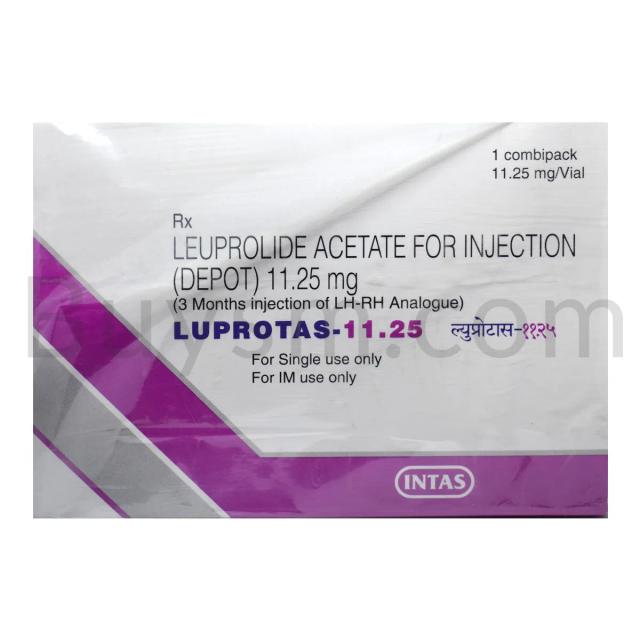

Prolide 11.25 mg Injection | 11.25 mg in 1 Vial
- Manufacturer/Marketed By
Celon Laboratories Pvt Ltd
- Active Pharmaceutical Ingredient
Leuprolide Acetate 11.25 mg
(Inclusive of all taxes)
Introduction of Prolide 11.25 mg Injection
Prolide 11.25 mg Injection is a gonadotropin-releasing hormone (GnRH) agonist. It is used to treat conditions related to hormone regulation, particularly those related to the reproductive system. It is also used to treat prostate cancer in men, breast cancer and endometriosis in women, and precocious puberty in children. The safety and effectiveness of Uses of Prolide 11.25 mg Injection have not been established in paediatric patients under the age of 1 year
Prolide 11.25 mg may cause some common adverse reactions including acne/seborrhea, vaginitis/vaginal bleeding/vaginal discharge, pain, rash including erythema multiforme, headache and vasodilation, injection site pain, increased weight, headache, mood changes and injection site swelling. Long-term use of this medicine may cause weakened bones and a decrease in bone mineral density. It is recommended that you take vitamin D and calcium supplements while taking this medicine. It may cause menstrual periods to stop for a period of 7-12 weeks, inform your doctor if menstrual bleeding continues even during treatment.
People who have had an allergic reaction to Prolide 11.25 mg or similar medicines should not take How Prolide 11.25 mg Injection works. Women who are or may be pregnant or who have undiagnosed uterine bleeding should not take Benefits of Prolide 11.25 mg Injection. Seizures have been observed in patients taking Prolide 11.25 mg Injection, in patients with a history of seizures or seizure-related conditions, or in patients taking medications associated with seizures. Seizures have been reported in patients without these conditions.
Before taking this medicine, tell your doctor if you drink alcohol, smoke or have osteoporosis. Many other medicines may interact with this medicine, so tell your healthcare team about all the medicines you are taking. The Benefits of Prolide 11.25 mg Injection is given by a qualified healthcare professional as an injection under the skin. It is your doctor who will decide what dose is needed and how often you will need to take it. This may change from time to time depending on what you are being treated for. You should take this medicine exactly as your doctor or health care professional advises. If you take it the wrong way, or if you take too much, you can get very serious side effects. It may take several weeks or months before you see or feel the benefits of this medicine. Do not stop taking this medicine unless your doctor tells you to.
Uses of Prolide 11.25 mg Injection
Endometriosis: Side effects of Prolide 11.25 mg Injection is used for the treatment of endometriosis, including pain relief and reduction of endometriotic lesions.
Uterine fibroids: Prolide 11.25 mg is used prior to uterine fibroid surgery to improve anaemia due to vaginal bleeding from uterine fibroids in patients who are deemed to require 3 months of hormone suppression. The duration of treatment with Benefits of Prolide 11.25 mg Injection is limited to 3 months. Symptoms associated with fibroids will return after therapy is stopped.
Advanced prostate cancer: How Prolide 11.25 mg Injection works is used to treat advanced prostate cancer.
Central precocious puberty (CPP): Prolide 11.25 mg Injection is used to treat children with central precocious puberty (CPP). It is not known whether Prolide 11.25 mg is safe and effective in children under the age of 1 year.
Benefits of Prolide 11.25 mg Injection
In the treatment of endometriosis: Endometriosis is a condition where tissue such as the lining of the uterus starts to grow in other places. The main symptoms are pain in the lower abdomen or back, period pain, pain during and after sex, constipation, diarrhoea and nausea. It can also make it difficult to get pregnant. Benefits of Prolide 11.25 mg Injection works by stopping the lining of your womb and any endometriosis tissue from growing too quickly. This will help to relieve any symptoms you may have. This medicine must be taken regularly to be effective and you may also need other medicines or procedures to help control your endometriosis.
Treating uterine fibroids: Uterine fibroids are non-cancerous growths of the uterus that often appear during childbearing years. Prolide 11.25 mg can help control the symptoms associated with uterine fibroids, such as excessive menstrual bleeding and lower back pain, and also reduce the size of existing fibroids. It works by blocking the action of the enzyme responsible for fibroid growth. As a result, they shrink and stop growing.
In the treatment of advanced prostate cancer: The prostate is a small gland about the size of a walnut that produces a fluid called seminal fluid that nourishes and carries sperm in men. The most common symptom of prostate cancer is difficulty urinating, but sometimes there are no symptoms at all. Prolide 11.25 mg Injection can reduce or stop the growth of cancer cells by reducing the amount of testosterone (a natural hormone in men) in men. This will also relieve urinary problems and make it easier to pass urine.
To treat precocious puberty (early puberty): When puberty (the change of a child's body to adult structure and size) begins before the age of 8 in girls and before the age of 9 in boys, it is called precocious puberty. Prolide 11.25 mg helps delay this early onset of adulthood and limits the onset of precocious puberty. However, this medicine is only given by a doctor and should not be used unless you have it.
Side Effects of Prolide 11.25 mg Injection
Like all medicines, Side effects of Prolide 11.25 mg Injection may cause some side effects. If you experience any of these side effects, contact your doctor as soon as possible. Your doctor may be able to suggest ways to manage or reduce the severity of these side effects.
Most Common Side Effects of Prolide 11.25 mg Injection
- Nausea
- Vomiting
- Dry mouth
- Confusion
- weakness
- Bone pain
- Dizziness
- Slow Speech
- Feeling thirsty
- Constipation
- Weight Fluctuation
- Muscle pain
- Runny nose
- Abdominal Pain
- Acne
- Nervousness
- Difficulty in remembering things
- Spotting
- Irregular menstruation
- Vaginal discharge
Common Side Effects of Prolide 11.25 mg Injection
- Hematuria
- Fainting
- Seizures
- Blurred Vision
- Difficult Breathing
- Severe Headache
- Decreased Sexual Desire
- Change in Breast Size
- Hot flashes
- Intense sweating
- Tingling sensation on feet and palms
- Feeling Uneasiness
- Decreased Testicles size
How to Use Prolide 11.25 mg Injection?
Your doctor or nurse will give you this medicine. Do not give yourself this medicine.
How Prolide 11.25 mg Injection Works?
Uses of Prolide 11.25 mg Injection contains leuprolide, which belongs to the class of gonadotropin-releasing hormone (GnRH) agonists. It is a synthetic hormone that acts similarly to GnRH produced by the hypothalamus gland in the brain. It works by inhibiting the synthesis of the natural male hormone, testosterone in men and oestrogen in women. This process of lowering hormone levels can reduce cancer cell growth in prostate cancer in men and shrink endometriosis and breast cancer in women.
Safety Advices Prolide 11.25 mg Injection
Breastfeeding
Unsafe
It is not recommended to breast-feed while taking How Prolide 11.25 mg Injection works. It is possible that Side effects of Prolide 11.25 mg Injection may pass into breast milk and harm the baby. If you are breastfeeding and taking Prolide 11.25 mg, it is important to talk to your doctor about the possible risks and benefits of continuing to breastfeed. Your doctor can help you make the best decision for you and your baby's health.
Pregnancy
Unsafe
The use of Prolide 11.25 mg during pregnancy may be unsafe as animal studies suggest that it may harm the developing foetus. However, if you are pregnant or planning to become pregnant, it is important to talk to your doctor about the potential risks and benefits of taking Side effects of Prolide 11.25 mg Injection during pregnancy. Your doctor can help you make the best decision for you and your baby's health.
Kidney
Use with Caution
If you have kidney disease, please consult your doctor before taking Prolide 11.25 mg Injection. Your doctor will weigh up the benefits and potential risks before prescribing it.
Alcohol
Unsafe
It is not recommended that you drink alcohol while taking How Prolide 11.25 mg Injection works. Alcohol may increase the risk of side effects or reduce the effectiveness of Prolide 11.25 mg. It is best to talk to your doctor or pharmacist before drinking alcohol while taking any medicine.
Liver
Use with Caution
If you have liver disease, please consult your doctor before taking Prolide 11.25 mg. Your doctor will weigh up the benefits and potential risks before prescribing it.
Driving
Unsafe
This Prolide 11.25 mg Injection can cause dizziness, drowsiness, and problems with concentration and coordination, which may affect your ability to drive safely. It is important to follow your doctor's instructions and take necessary precautions such as avoiding driving or operating heavy machinery if you are experiencing the side effects of this Prolide 11.25 mg.
Similar Medicines
Anti-Cancer
Why customers like you choose BuySM.com?

Genuine Medicine
We maintain complete transparency in our sourcing and supply chain processes.

Secure Payments
This ensures that all data exchanged between your browser and our server remains confidential and secure

Fast Delivery
Stay informed about the status of your order with our real-time tracking feature.

Best Price & Offer
Enjoy even greater savings by taking advantage of our bundle offers.

5,000
Total Customers

15,000+
Products Sold Out

10,000+
Orders Delivered

10+
Cities





